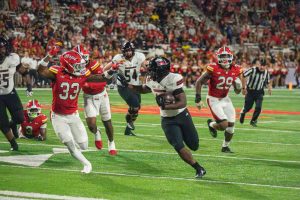Hate crimes have stiff penalty
February 27, 1990
Students who distribute racist fliers and newspapers or make derogatory statements to intimidate other students might be in for more than they bargained.
NIU Judicial Office Director Larry Bolles said hate crimes can be just about anything, but they usually involve violence directed at some person or group. Most hate crimes are ethnically motivated, he said.
The Illinois State Criminal Code on Ethnic Intimidation states hate crimes include a specific motivation to commit a crime of an ethnic origin, Bolles said.
He also said hate crimes might involve stiffer penalties than other violent crimes because they are committed against ethnic groups.
The code states ethnic intimidation is a Class A misdemeanor, punishable by up to one year in prison and a $1,000 fine, DeKalb Assistant State’s Attorney Chester Brough said.
“Any person who is involved in ethnic intimidation as a particpant in mob action which results in the violent infliction of injury to the person or property of another person shall be guilty of a Class 3 felony,” the code states.
A Class 3 felony is punishable by no less than three years and no more than seven years in prison, Brough said.
Bolles said if a student makes a racist comment to another student directly, that student faces the possibility of expulsion from the university.
“But the area is gray when a general statement is made to a group,” he said.
Bolles said the question is whether what was said “creates an environment on campus that is not conducive to education.”
“People have a right to their point of view, but the more people get involved, the more tension there is. The question here is, is there a violation? Is the discussion going on in the privacy of one’s own room?” Bolles said.
Bolles said there are times when racist literature is posted on NIU bulletin boards. Any literature posted on a public bulletin board must have the University Programming and Activities approval and stamp, he said.
If anyone sees something that is racist and not approved, he can take it down, Bolles said.
NIU Legal Counsel George Shur said unless a speech is defamatory or includes “fighting words,” it will be protected. Fighting words are something “in a reasonable person’s mind that could lead to violence against person or property or potentially lead to immediate confrontation,” he said.
Charlie Sharp, superintendant of postal operations for the DeKalb Post Office, said second class mail including magazines and newspapers like Thunderbolt, a white supremacist newspaper, are considered unprotected mail.
This does not mean the paper’s contents are unprotected, but postal inspectors can look inside the paper to check for proper pay rates, Sharp said. Pay rates are determined by the amount of advertisements in the paper, he said.
Shur said the problems of racist fliers and newspapers are anonymous and the “people involved are afraid to come out from under the rocks.”
The NIU Student Judicial Code sets the policy for harassing speech and fighting words, Shur said.
The judicial code states harassment is “intentionally harassing, coercing, intimidating, threatening or seriously embarrassing any person through conduct which would offend a reasonable person.”
Harassment of a group is defined as “acting or communicating in a manner which intentionally harasses, coerces, intimidates, threatens or seriously embarasses any person(s) on the basis of race, ethnicity, religion, gender, sexual orientation or handicap.”
Shur said the key to the definition is “intentionally harasses.” He said very few people pass out information with the intent to harass.
People might just be suffering from a lack of sensitivity and do not realize what they said might offend someone, he said.
“It might not be discriminatory, but it is insensitive and it is not right,” Shur said.






